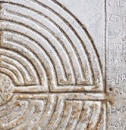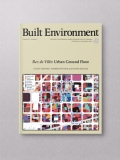
'Cognition and the City: An Introduction'
The contributors to this issue explore the integration of two disciplinary domains – cognition as studied mainly in cognitive science, and cities as studied in disciplines such as urban studies, urban geography and architecture.
About this issue
Summary
The contributors to this issue explore the integration of two disciplinary domains – cognition as studied mainly in cognitive science, and cities as studied in disciplines such as urban studies, urban geography and architecture.
Contents
-
Cognition and the City: An Introduction
JUVAL PORTUGALI -
Movement, Cognition and the City
JUVAL PORTUGALI and HERMANN HAKEN -
The City is the Map: Exosomatic Memory, Shared Cognition and a Possible Mechanism to Account for Social Evolution
ALAN PENN -
What Makes Us Think It’s a City?
EFRAT BLUMENFELD-LIEBERTHAL, NIMROD SEROK, and ELYA L. MILNER -
People in the Environment and Environments Perceived by People: Cognitive-Behavioural Approaches to Spatial Cognition
TORU ISHIKAWA -
How are Geographical Judgments and a Geographical Entity’s Shape Connected in Cognitive Mapping
ITZHAK OMER -
Representations of an Urban Ethnic Neighbourhood: Residents’ Cognitive Boundaries of Koreatown, Los Angeles
CRYSTAL JI-HYE BAE and DANIEL R. MONTELLO -
Rotational Locomotion in Large-Scale Environments: A Survey and Implications for Evidence-Based Design Practice
VASILIKI KONDYLI and MEHUL BHATT - Publication Reviews
Forthcoming issues include: Branded Landscapes in Contemporary Cities; Sharing Space: Sharing Practices and Shared Spaces in the City; Changing Patterns of Commuting to and in the City
The Contributors
Crystal Bae is a PhD student in the Department of Geography, University of California, Santa Barbara. Her master’s research explored urban residents’ understanding of the cognitive boundaries of their neighbourhood, focusing on the physical and social features of the environment. Her PhD focuses on aspects of social interaction within paired route planning and navigation. Her research interests are in the areas of spatial cognition, navigation, and wayfinding, especially in relation to the urban built environment.
Mehul Bhatt is Professor in the School of Science and Technology at Örebro University, Sweden and Professor in the Department of Computer Science at the University of Bremen, Germany, where he leads the Human-Centred Cognitive Assistance Lab. He is director of the research and consulting group DesignSpace, and he has recently launched CoDesign Lab EU, an initiative aimed at addressing the confluence of Cognition, AI, Interaction and Design. His research encompasses artificial intelligence, spatial cognition and computation, visual perception, and human-computer interaction.
Efrat Blumenfeld-Lieberthal is a Senior Lecturer in the David Azrieli School of Architecture, Tel Aviv University and a member of the founding team of City Center, the Tel Aviv University Research Center for Cities and Urbanism. Her research interests are applying theories of complexity to urban environments; urban morphology; size distribution of entities in complex systems; and complex networks in urban and human systems. Recently, she has been focusing on smart cities and the way they influence urban development.
Hermann Haken was Professor of Theoretical Physics at Stuttgart University from 1960 to 1997. He has been visiting scientist/professor in China, England, France, japan, USA. He is one of the fathers of laser theory, and initiated synergetics that deals with the self-organization of structures and functions in complex systems. He developed mathematical tools and general concepts, that have found applications in fields ranging from physics and chemistry to biology and neuroscience, cognitive science and information. He was founder and editor of the Springer Series in Synergetics.
Toru Ishikawa is a Professor at the Graduate School of Interdisciplinary Information Studies at the University of Tokyo. He specializes in cognitive-behavioural geography and geographic information science. His research interests include human spatial cognition and behaviour, wayfinding and navigation, and spatial thinking in geoscience.
Vasiliki Koydyli is a PhD candidate in the School of Science and Technology at Örebro University, Sweden. She is an architect by training and since 2016 has been a member of the DesignSpace (www.design-space.org) first as guest researcher, then as research assistant. Her research interests include spatial cognition, environmental psychology, design computing and cognition, and evidence-based design.
Elya L. Milner graduated from the Tel Aviv University School of Architecture, Magna Cum Laude. After several years working as an architect in private firms, she began a combined MA and PhD track at the Department of Politics and Government at Ben Gurion University, under the supervision of Professor Haim Yacobi. Her PhD research focuses on the construction of rights, belonging and entitlement in and to the Israeli-Palestinian contested space.
Daniel R. Montello is Professor of Geography and Affiliated Professor of Psychological & Brain Sciences at the University of California, Santa Barbara. His research is in the areas of spatial, environmental, and geographic perception, cognition, affect, and behaviour. Dan has authored or co-authored some100 articles and chapters, and co-authored or edited six books. He currently co-edits the academic journal Spatial Cognition and Computation.
Itzhak Omer is Professor of Urban and Social Geography in the Department of Geography and the Human Environment and Head of the Urban Space Analysis Laboratory at Tel Aviv University. His areas of academic interest include urban modelling, agent-based models, urban morphology, movement, spatial behaviour and cognition, urban systems and social geography of the city. His research examines processes connecting urban built environments to spatial behaviour and cognition, movement, and the formation of social and functional urban areas. He also develops agent-based models for simulating and modelling motorized and non-motorized movements in planned or in existing urban environments.
Alan Penn is Professor of Architectural and Urban Computing, and Dean of The Bartlett Faculty of the Built Environment at University College London. His research is into the effect of the spatial design of the built environment on the social and economic function of organisations and communities.
Juval Portugali is Professor of Human Geography in the Department of Geography and the Human Environment, Tel Aviv University. Head of City Center, Tel Aviv University Center for Cities and Urbanism, and of the Environmental Simulation Laboratory (ESLab). His research integrates complexity and self-organization theories, environmental-spatial cognition, urban dynamics and planning in modern and ancient periods. His publications include more than 70 research articles and 16 books.
Nimrod Serok is a PhD candidate at the Azrieli School of Architecture at Tel Aviv University, where he also completed his BArch and MArch (both first in his class). His work focuses on urban complexity with an emphasis on urban mobility patterns and spatio-temporal data analysis. He is experienced as a practicing architect and urban planner.




